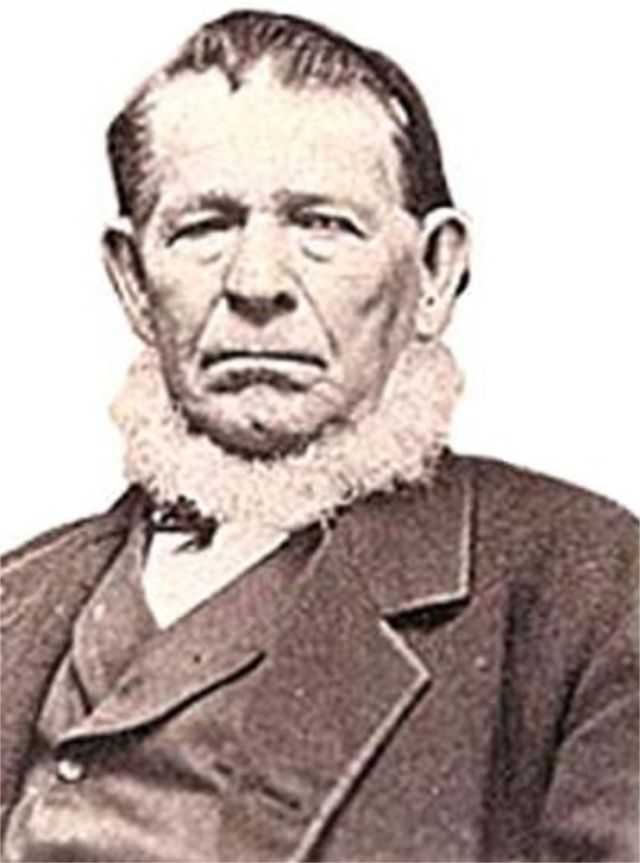Josiah Butterfield
(1795-1871)


By Susan Easton Black
On October 1, 1833 Josiah accepted the message of the Restoration and entered baptismal waters. Within a year, he was the missionary companion of Sylvester Stoddard laboring in his own neighborhood of Buxton, Maine. In 1835 Josiah and several of his neighbors moved to Kirtland, Ohio, to be with the Saints of God.
On April 6, 1837 Josiah was appointed one of the Seven Presidents of the Seventy. He took a leadership role in organizing the Kirtland Camp. He journeyed with the camp to Missouri and established his home in Daviess County. Josiah covenanted to assist the poor in removing from the state at the time of the government sanctioned extermination order. In a Missouri Redress Petition, he itemized his personal losses from being forced to abandon his home and move from the state:
To expences of journey & time in moveing from Ohio to Mo,
in the summer of 1838 $200.00 Loss of time while in the State of Mo. Six months at 35 dollars per month 210.00 To Loss of horse & waggon taken by the mob & militia 100.00 To one musket taken by the malitia in Daviss Co. 8.00 To loss of furniture at Richmond landing 16.00 For being driven out of Daviss Co. in the month of November and being thereby exposed to the inclemency of the weather which has caused the sickness of my wife during the winter from which She has not yet recovered 1,000.00 For being driven out of the State of Mo. by the authorities there of & being deprived of citizenship 2,000.00 To loss on a Note due me in consequence of being driven out of the State of Mo. 240.00 $3.774.00
. . . In addition to the above I was taken prisner from my dwelling without any cause & shamefully treated by the malitia in Daviss Co. Mo.1
Josiah settled with the Saints in Nauvoo. He anticipated a peaceful existence in the city of the Saints, but instead faced some of his most severe trials. He was arraigned before the Quorums of the Seventy “for a number of criminal charges.” On each charge, he was acquitted.
Nauvoo Nov. 1st, 1840.
TO THE SAINTS SCATTERED ABROAD.
Be it known that Elder Josiah Butterfield, (one of the Presidents of the Quorum of Seventies,) was arraigned before the Quorum on the 4th of Oct. last and tried for a number of criminal charges. But the Quorum are happy, publicly to announce, that after a patient and candid investigation, the charges were unsustained, and Prest Butterfield stands acquited by the counsel and Quorum.
- PULSIPHER, Chair.
A P. ROCKWOOD, Clerk.2
On January 19, 1841, in a revelation given to the Prophet Joseph Smith, Josiah was once again named one of the Seven Presidents of the Seventy (D&C 124:138-39). His status as a president was questioned a second time in 1843. The Prophet Joseph reported on March 28, 1843, “Josiah Butterfield came to my house and insulted me so outrageously that I kicked him out of the house, across the yard, and into the street.”3 Joseph F. Smith, the son of Hyrum Smith, watched the incident:
I was one day playing marbles in front of the Mansion with my cousin Alexander Smith. We were amusing ourselves on the sidewalk . . . playing at the gate just outside the stone steps, when all of a sudden the door flew open and I looked, and there came a great, big man right off the end of Joseph Smith’s foot, and he lit on the sidewalk just by the gate . . . Since I grew to be a man, I learned that this man was there insulting the Prophet, and abusing him in his own house.4
At the October 1844 General Conference, Josiah was not sustained as a president of the Seventy. He was cut off from the Church because “he had got a little money, and was lifted up.”5 He returned to the faith and received his endowment in the Nauvoo Temple. When the Saints left Nauvoo on the first leg of their journey west, Josiah was not among them. He moved to Northern California, where he affiliated with the Reorganized Church of Jesus Christ of Latter Day Saints in Watsonville, serving as president of their local branch.
Josiah died on March 3, 1871 in Watsonville at age seventy-five.
1. Clark V. Johnson, ed., Mormon Redress Petitions: Documents of the 1833-1838 Missouri Conflict (Provo, UT: Religious Studies Center, Brigham Young University, 1992), p. 151.
2. Times and Seasons 2 (November 1, 1840), p. 207.
3. Smith, History of the Church, 5:316.
4. Joseph F. Smith quote, in Brian H. Stuy, Collected Discourses (Burbank, CA: B.H.S. Publishing, 1987-1982), 5:28.
5. Smith, History of the Church, 7:297.
Additional Resources
- Biography of Josiah Butterfield (josephsmithpapers.org)
